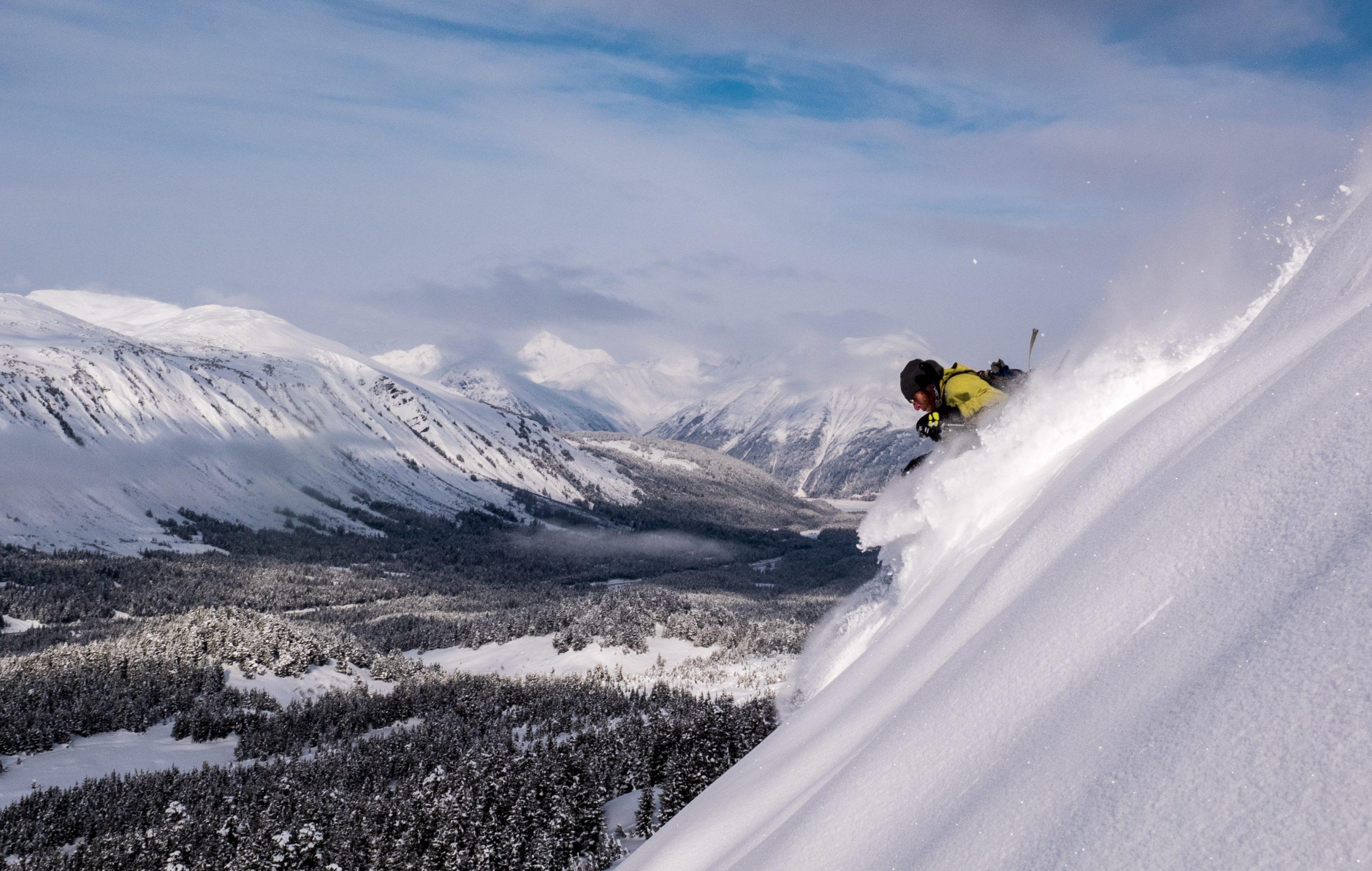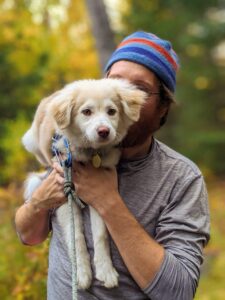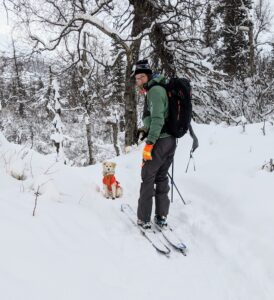
Drinks with Lang—new routes and the economies of play
By Dawnell Smith
Lang Van Dommelen typically arrives at the office early with a fluff-ball office dog underfoot and a boulder-like temperament—solid and steady, but ready to roll. He’s the go-to person for negotiating the technical elements (and glitches) of filing a lawsuit and something of a jack of all trades when it comes to getting things done.

Lang and Hattie, Photo by Jovell Renny
He started as Trustees’ legal assistant in 2020, eager to take on a fill-in position while getting his master’s degree. Now he sees it less of a “job” and more of a fractal of his life’s throughline, an extension of what he’s always wanted to do. It helps that Trustees’ work culture and mission align with his.
Plus, it turns out that this Alaska kid born in Kentucky once considered law school when a first-year student in college. “I first wanted to do human rights law,” he said. “I was environmentally focused, but it was for me about people and giving them a voice through the law.”
The economic landslide brought on by the housing market crash of 2008 and the ensuing years made it hard to trust finding viable job opportunities, let alone as a human rights lawyer, so after college he took the advice of mentors and friends and took a different path toward policy work.
Taking a different path comes naturally to Lang. While in high school, he spent a year in Thailand through a Rotary Exchange in 2005. While there, he grew acutely aware of class structures and tensions. He lived with a well-to-do host family with one political leaning and dated a girl with a decidedly working-class perspective. The experience opened his eyes to what conflict meant for the people most impacted, and only deepened his commitment to human rights.
Likewise, his climbing life has been defined by finding new routes. He discovered indoor climbing as a kid, becoming a rabid rock-gym rat craving and tackling tougher and tougher climbs; and when the mountains later took his heart, that just meant opening up to all of it—the people, the places, the animals, the elements.

Lang in Thailand during his Rotary year
His parents Dorn and Diane Van Dommelen said that Lang always had deep passion for what he cared about and put that passion to work. He protested against the construction of the Bird Creek parking lot below Bird Ridge when in high school, they said, and in college he led a club called the Students for Social Equality that protested the naming of the Conoco Phillips Building.
“Lang is just a passionate person and always has been,” they said in a shared email. “Even in his play he was so engaged and full of spirit. Once he found climbing, he threw himself into it and has worked to protect the crags he loves both by picking up garbage and by fighting against over-development and unnecessary bolting.”
First ascents
Here’s a funny story about Lang.
Lydia Heye, a former Trustees’ legal fellow, said when she mentioned where she worked and who she worked with when talking to the guy putting up routes at the rock gym, he said something like, “Wait, you work with THE Lang Van Dommelen?”
Lang has a reputation. You might say he’s infamous or a legend in local climbing circles. He first turned heads in the rock gym and on mountain walls, and he now embraces the full scope of backcountry toil and joy, from climbing and hunting to camping, skiing and winter treks. (You can find some of Lang’s climbs on The Mountain Project, an online site where climbers share routes.)

Climbing in Gates of the Arctic. Photo by Gus Barber
Before COVID hit—before he took a job with Trustees—Lang joined Gus Barber and Chris Williams in climbing a new route up the east face of Caliban in the Arrigetch Peaks of the Brooks Range in the Arctic. An Alpinist magazine article about the trip quoted Lang several times and noted, “Aside from overall good rock quality, the Arrigetch Peaks are synonymous with atrocious weather, grizzly bear encounters and mosquitoes that yellow the sky.”
Lang doesn’t have any big trips planned this summer, but he does have a smaller one planned in November—a bison hunt in the Delta Junction area in November. He does winter ski camping trips all the time, but even he grimaced when thinking about field dressing a big animal during a month and place known for an average high of 14 degrees.
Some people spend a lifetime trying to get a bison permit, so when you get one you take it, he said. “I love the experience of interacting and being with the animals in an intimate way and being connected to my food,” he said.
The Heart of a Child
Here’s another funny story about Lang.
“I didn’t meet Lang until he was 30, but he still has the heart of a child,” said his partner Barbara Johnson. “Did you know he dashes across the house whenever he sees a fire truck because he loves watching them?”
That childlike Lang comes out when he talks about what he wants to do next, and how it centers on the economies of play, recreation, the re-creating of the relationships people have with the more-than-human world.

Lang with his puppy (now grown) in 2021
When Lang graduated with a bachelor’s degree in political science and environmental studies, he angled toward policy work that could transform the approach to nature and natural resources to create jobs and economic vitality by taking care of land and water, not extracting and destroying them.
“Lang is dedicated and committed to improving the world,” Barbara added. “He has a strong passion for environmental issues and the legal matters related to recreation and outdoor access.”
After college, Lang took an array of jobs that allowed him to form deep relationships with communities outside of Anchorage and places beyond where he grew up.
He took several internships and education jobs, including doing K-12 curriculum for the Renewable Energy Alaska Project and the Alaska Center for Energy and Power, and outreach work with the Alaska Energy Authority. He landed a position with a small alternative energy company in Anchorage that mostly worked in western Alaska where he helped build relationships with communities interested in wind energy systems.
“You really have to build relationships of trust with people,” he said. “It wasn’t about a big state entity coming in and telling people what they needed to do, but about asking, ‘What do you need?’ and ‘What can we do to help you achieve those goals.’”
He later took a job for the biggest Alaska-owned fishing company where he managed heating and elder assistance programs funded through trawling. Though he supported efforts to benefit communities and spent a lot of time in local communities, he struggled with the extractive and wasteful nature of the company’s work.

Skiing with the pup in 2021.
That work environment was really unhealthy for a lot of reasons, he said, “but the relationships with local people were and are amazing.”
When laid off from that job in February 2020, he applied for an administrative position with Trustees, but was asked instead to interview for the legal assistant position. The job offer came in March 2020, but he ended up starting work remotely in June. It took a year for him to realize the position felt less like a fill-in job and more like the perfect alignment of goals and values.
“I felt like a cog in my previous job,” he said. “COVID was interwoven with everything that first year, but I felt a part of a team in a good work environment with the right mission.”
The next adventure
Lang graduated a few weeks ago with a master’s in public administration with a focus in rural development with an emphasis on outdoor recreation and natural resources, though he plans to stay with Trustees for a time. He appreciates how the work ties into a larger movement and how the people he works with really care about their relationships with clients and partners.
“You can really tell how much the attorneys care about the people they’re working for,” he said. “When people think of the law, they often think of trial law, but there’s so much that happens behind the scenes, so much relationship-building, even with opposing counsel, and it’s telling that Trustees attorneys often stay ten years or more when they could take a corporate law job and make two or three times more money.”
The same can be said for Lang, who cares deeply about relationships and people, and has and could find higher paying positions.
He said he’s not leaving any time soon, though. Instead, he hopes to pick up small contract jobs that support communities that want to center recreation over extraction—to rethink how the ways people play and experience land and water can turn into the economic drivers that sustain the health of people and the land.
He sees his role in this work as doing the things no one else wants to do, like fundraising, grant writing, and building the infrastructure to sustain a program that supports recreational uses.

A climbing expedition in the Talkeetna Mountains. Photo by Lang.
He mentioned the Bristol Bay Fly Fishing and Guide Academy (formerly the Bristol Bay River Academy) as an example, a program aimed at preparing young people from Bristol Bay and who are Bristol Bay Native Corporation shareholders or descendants to advocate for salmon and work in conservation and stewardship, or in tourism as fishing guides.
Another program he likes, but has never experienced, is the Carcross/Tagish First Nation Singletrack to Success program, which in 2006 mandated the building and maintaining of a bike trail system by First Nation youth. Mountain bikers now see the area as world-class, and the economic benefits extend to many local and Yukon businesses.
In the short term, though, Lang plans to enjoy another Alaska summer without the college grind at the door. He may have lived in Kentucky and Toronto until age 6, but there’s no place like Alaska.
“The wilderness here is not like the wilderness elsewhere,” he said. “Even in Anchorage you can drive 20 minutes and hike 15 and not see another person. And you can get places where you don’t even see planes anymore.”
Perhaps that’s one thing many Alaskans can agree on, whatever their differing views—that Alaska’s landscapes and our relationships with them matter. That’s what makes working at Trustees fit with Lang’s throughline, though it’s more a circle than a line.
“I do believe that Trustees protects the wilderness experience,” he said. “It’s not hard to see that people have been inhabiting places forever and also understand that there are places humans should not change or overwhelm.”

Sunrise in Gates of the Arctic. Photo by Lang
This is the ninth in a series of profiles based on interviews with Trustees’ staff over drinks, this time over an IPA at Onsite Brewing Company in Anchorage.
More in the “drinks with lawyers” series:


